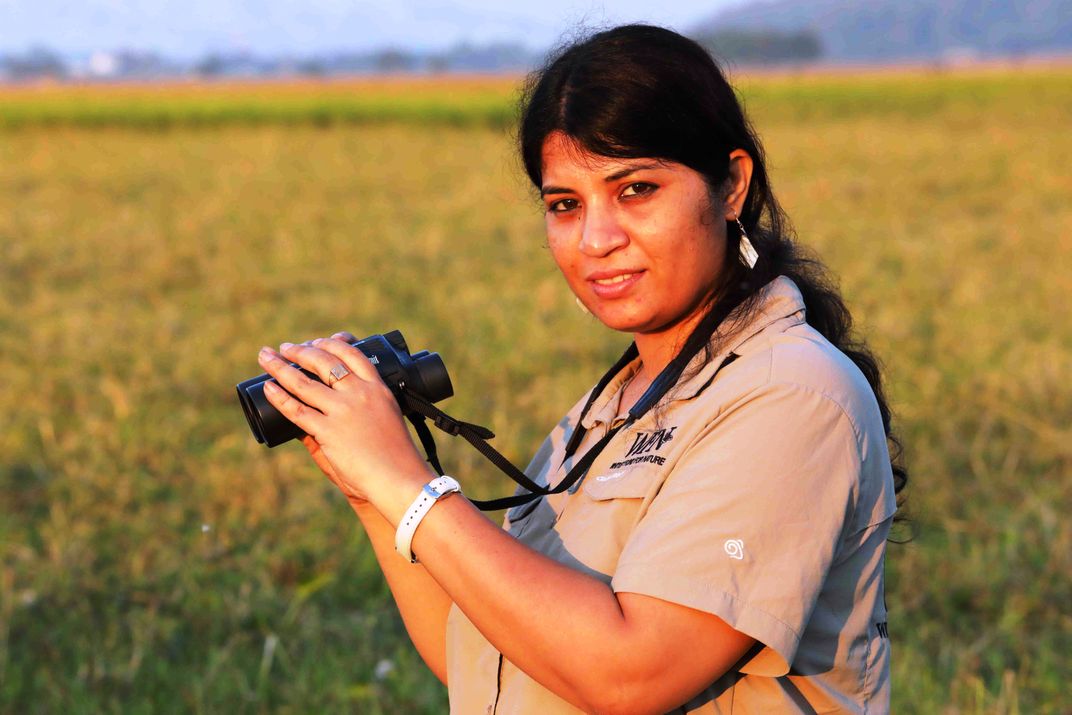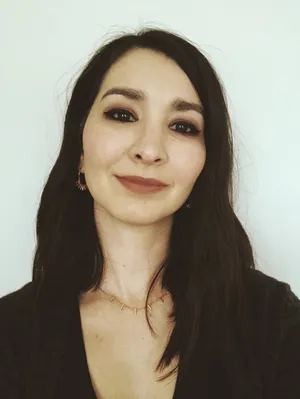Building An All-Women Army for Conservation In India
Earth Optimism Speaker Interview with Purnima Devi Barman.
:focal(746x498:747x499)/https://tf-cmsv2-smithsonianmag-media.s3.amazonaws.com/blogging/featured/IMG-20200222-WA0005.jpg)
Dr. Purnima Devi Barman is a conservation biologist in Assam, India, where she pioneers conservation efforts for the endangered Greater adjutant stork (Leptoptilos dubius). The local communities call the storks Hargila (bone-swallowers) as they are scavengers and often seen feasting on carrion. Through her work to protect Hargila, Purnima has founded a group called the "Hargila Army," which has organized and empowered hundreds of local women as fellow conservationists and community advocates.
Purnima will be speaking at the Earth Optimism Summit* as part of the Species and Spaces: In My Neighborhood spotlight session. Ahead of the Summit, she tells us more about her conservation success and what inspires her to stay hopeful.
Tell us about your own success story. It's incredibly inspiring for women interested in conservation!
I want to share the story of our communities and the Hargila Army from Assam. I think this is very important for the world to know the efforts of the community and how rural women are leading the protection of this endangered bird, its breeding and roosting trees, and its habitats. Earlier, the Greater Adjutant was treated as a bad omen, a dirty pest, and an ugly scavenger in most of the villages in Assam, and people used to cut down the nesting trees in many breeding colonies. Greater Adjutants were not treated as charismatic species like rhinos, tigers, and elephants, even though they are technically more endangered than these megafauna species. The birds breed in tall trees in privately owned areas in villages amongst thickly populated villages and the support of the tree owners. We started our campaign in 2007 with 28 nests in Dadara Pacahriya Singimari colony in Assam and 40 nests in All over Assam. In the last 12 years, through behavioral change-oriented environment education, livelihood mechanism, and women empowerment, we have developed a strong sense of pride for this bird among communities. In Dadara Pachariya Singimari nesting colony, nests numbers increased up to 208 nests in 2019 and 270 nests in entire Assam, making Assam the biggest stronghold and the biggest nesting colony. 400 rural women came forward to give a voice for Hargila bird, its breeding and roosting trees, and wetlands habitats.
Women have integrated the bird into their local traditions, folk songs, and cultures. Hargila has also started stealing the spotlight like rhinos, tigers, elephants. We are giving a voice to the biodiversity of unprotected areas along with the protection of lesser-known species, which we are losing at an alarming rate as the Government does not protect them. I want everyone in this world to know about Hargila and the role of women and their voices for this species and unprotected areas.
What initially sparked your interest in conservation?
I have been obsessed by nature since my childhood as I grew up in paddy fields, amidst of wetlands and on the bank of might Brahmaputra in Pubmajir gaon village in Palasbari in Kamrup District, Assam.
I never imagined that I would work with Greater Adjutants one day. When I was doing my Masters, I chose ecology and wildlife biology because I had always been obsessed with nature. I was inspired by my teachers, Professor PC Bhattacharjee and Professor PK Saikia, to participate in specific wildlife camps and meetings. I decided to do my Ph.D. on Greater Adjutant storks as I learned this bird was declining at an alarming rate. One of my teachers also told me that the meat of this bird was served in some restaurants as a dish. To pursue my Ph.D., I visited a village and encountered what was, for me, a life-changing event. One man cut down a nesting tree with nine nests, and as a result, nine baby birds fell in front of my eyes. I dared to speak to him. I questioned him why he had done doing such inhumane, barbaric things. His reaction to this was quite shocking. He furiously shouted at me, and he and his neighbors even proposed me to be their housemaid to clean all the mess, including the dirty rotten foods and excreta of Greater Adjutant birds. He also told me the bird was a bad omen.
When I tried to rescue those fallen chicks, some people came forward and started mocking me and asked me, "Would you eat the Hargila meat on the way." A few people even played with the birds like toying with wings of the birds.
That day I realized that we needed to create more awareness, build strong ownership, and preach environmental education for this bird. I delayed my Ph.D. and started working on Greater Adjutant storks with a mission to aware and educate the people about the importance of the birds in a village with more than 10,000 people. The more the people said that this bird was a bad omen, the more I became obsessed with the Greater Adjutants and the field of wildlife conservation.
What makes you optimistic for the future of our planet?
When I go to local schools to educate young minds and meet the very young kids of different age groups, I feel optimistic. When they respond and share their feelings about our presentations, I get goosebumps. The young innocent children's reaction when they witness and learn about Hargila birds (or any wildlife) in our presentations brings a positive picture in mind, and I am blown away. Their excitement and bright eyes give me lots of hope. When I recently visited the village where I am working, a little one year boy started chuckling and brimming with laughter and joy when he saw a Hargila bird flying in the wild and even while seeing a Hargila on a poster. When a young girl does mimicry with a paper made binocular to be a future conservationist, I am confident that there is still hope for the future.
When I meet my Hargila Army, which is an all-women team that functions as the voice of rural women protecting the trees and Hargila, I realize that our world is so beautiful. This is the driving factor and a resource for my team and gives us all the energy to be optimistic. While enjoying my motherhood and raising my twin daughters, I realized how much we need to give our best to save our planet for the sake of the future of all children. Hargila birds have beautiful sky blue eyes, which never fails to remind me that the sky is the limit and motivates me to give my best in my work.

Who inspires you to stay hopeful amidst the constant doom and gloom surrounding conservation?
Sir David Attenborough and Jane Goodal are two icons who inspire everyone, including me. Apart from this, I get inspiration from all the local people, especially the Hargila Army women group. We have formed an all-women army group called Hargila Army to protect the nesting and roosting trees, Hargila birds, and the wetlands. These rural women who were not aware of the birds and environment earlier now give a strong voice and stand with nature and for nature. Each woman stands for and cares for a Hargila bird, which was earlier treated as a bad omen, messy, and unclean birds. When I go to the village, each woman from every household comes outside with cheers and start sharing their feelings for Hargila and their concern and love for nature. I understand how much a rural woman or housewife from a village is busy with their cooking, maintaining their house, raising children. When these women come forward to give a voice, this inspires me a lot. Moreover, children of my community also inspire me and are a reason for me to be hopeful a lot
What are you looking forward to the most at the 2020 Earth Optimism Summit*?
Being born in a small village and being a woman conservationist amidst so many challenges from the northeast part of India, participating in the 2020 Earth Optimism Summit is a big learning opportunity for me. I will be very serious and strongly represent my state Assam and our country India. I hope that all will know my state Assam from my participation and my talk. I am looking forward to learning from all the success stories, challenges being carried out by world leaders, and grassroots conservationists.
I am looking forward to sharing our Greater Adjutant conservation story to the rest of the world through this summit. I am looking forward to building connections, networking, and bring beautiful memories and ideas back to my state. I strongly hope that our species Greater Adjutant Stork (Hargila), my local communities, and our biodiversity will get benefited from my participation.
----
* As a public health precaution, the Smithsonian is postponing the Washington, D.C.-based summit to a later date. Instead, on the 50th anniversary of Earth Day 2020, join us online for an Earth Optimism digital event that will showcase stories of both small and large-scale actions that frame the conversation and demonstrate that success is possible. The same speakers, the same content -- digitally! Stay tuned here and on our social media feeds for updates on how to watch online, and for a new date for our rescheduled in-person summit. We invite you to share your stories of success on #EarthOptimism and help us inspire millions of people around the world for greater impact!

